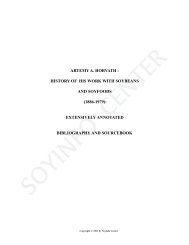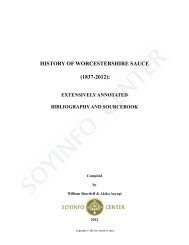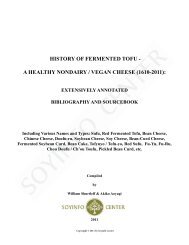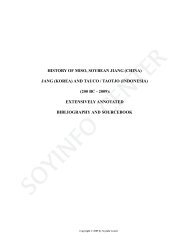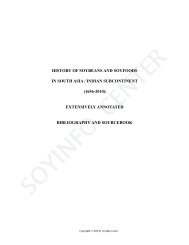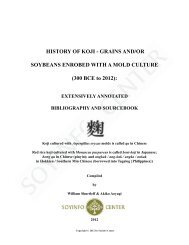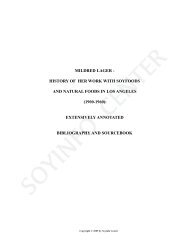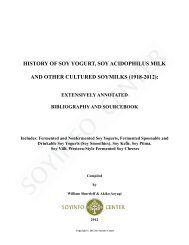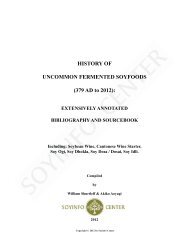HISTORY OF EREWHON - NATURAL FOODS ... - SoyInfo Center
HISTORY OF EREWHON - NATURAL FOODS ... - SoyInfo Center
HISTORY OF EREWHON - NATURAL FOODS ... - SoyInfo Center
Create successful ePaper yourself
Turn your PDF publications into a flip-book with our unique Google optimized e-Paper software.
1971 March – Roger Hillyard is replaced as general<br />
manager of Erewhon–Boston.<br />
1971 March – Paul Hawken finalizes a contract with Carl<br />
Garrich of Lone Pine, Arkansas, to grow short-grain brown<br />
rice organically and exclusively for Erewhon. 330 acres are<br />
planted in April. That fall, Erewhon starts to retail and<br />
wholesale its first organic brown rice.<br />
1971 May – Bruce Macdonald leaves Erewhon in a dispute<br />
over ownership of the company.<br />
1972 – John W. Deming Jr. plans to invest $150,000 in<br />
Erewhon in exchange for stock, and Advest Co. plans to<br />
conduct Erewhon’s first public stock offering–but neither<br />
happens after Michio Kushi nixes the plans.<br />
1972 fall – Erewhon first buys organic brown rice from<br />
Lundberg brothers of California; a fire that destroyed<br />
Chico-San’s plant in early Aug. 1972 rendered their<br />
exclusive contract with the Lundbergs null and void.<br />
1973 Aug. – Paul Hawken writes a critical history of<br />
Erewhon and its problems. Published in East West Journal<br />
it is titled “Erewhon: A Biography. The View Within.”<br />
Shortly thereafter Paul Hawken resigns, saying that running<br />
Erewhon was a nightmare. Some say he sells his 25%<br />
ownership back to the company, which was subsequently<br />
managed by Bill Garrison, Tyler Smith, Jeff Flasher, and<br />
Tom Williams, in that sequence.<br />
1974 July to 1977 – Erewhon becomes the exclusive<br />
representative and agent for both the Muso and Mitoku<br />
companies in North America. The labels of all products<br />
imported from these companies must bear the Erewhon<br />
label. Starting in late 1969 a number of macrobiotic and/or<br />
natural foods companies grew into distributors following<br />
the models established by and with help from Erewhon:<br />
Eden Organic Foods in Ann Arbor (started by Bill Bolduc<br />
on 4 Nov. 1969), Food for Life (started in 1970 by Bill Tara<br />
as a retail store on the 10th floor of a Chicago office<br />
building), Janus in Seattle, Washington (Jan. 1972, by<br />
George Gearhart and Blake Rankin, formerly of Spiral<br />
Foods), Essene in Philadelphia, Pennsylvania (by Feb.<br />
1971), Laurelbrook in Maryland (Aug. 1971), Ceres in<br />
Colorado Springs (1973), and The Well in San Jose,<br />
California (1973, by Phil Parenti). These macrobiotic<br />
distributors had a strong influence on the numerous other<br />
non-macrobiotic natural food distributors, such as<br />
Lifestream (started in 1969 as a retail store), Westbrae in<br />
Berkeley, California (wholesale distribution: July 1970, by<br />
Bob Gerner; retail: Feb. 1971, Gerner). Shadowfax (New<br />
York, 1971), and Tree of Life in St. Augustine, Florida<br />
(retail: May 1971; wholesale distribution: Feb. 1972, by<br />
Irwin Carasso).<br />
Copyright © 2011 by Soyinfo <strong>Center</strong><br />
<strong>HISTORY</strong> <strong>OF</strong> <strong>EREWHON</strong> 12<br />
1975 Aug. 1 – Erewhon sells all of its West Coast Division<br />
in California (Los Angeles and Culver City) to John<br />
Fountain and John Deming for cash and notes, realizing a<br />
net gain of $86,872.<br />
1977 March 23 – Erewhon sues natural foods retail stores<br />
in several states for boycotting Erewhon for selling to coops.<br />
Erewhon eventually wins the case, but its legal bills are<br />
something like $250,000. There was not enough money to<br />
pay these fees and Erewhon never recovered.<br />
1978 (early) – Erewhon moves into a huge warehouse and<br />
office complex at 3 East St., Cambridge, Mass. 02141.<br />
1979 April 27 – The workers in Erewhon’s production,<br />
trucking, shipping, and kitchen departments vote 42-19 to<br />
form a union affiliated with Local 925, the Service<br />
Employees International Union.<br />
1979 – John Deming steps in to liquidate all the assets of<br />
financially failing Erewhon–Los Angeles. Tom DeSilva,<br />
Tyler Smith, and Jeff Flasher buy the retail store at 8001<br />
Beverly Blvd.<br />
1981 Feb. – Erewhon currently lists 4,000 products in its<br />
catalog–in its bid to become a full-line distributor. It<br />
services 2,000 customers and provides jobs for 175 people<br />
in its warehouse and retail stores.<br />
1981 Nov. 10 – Erewhon files for bankruptcy protection<br />
under Chapter 11 of the Federal Bankruptcy Act because of<br />
debts totaling $4.3 million. At this time, Aveline Kushi is<br />
the sole owner of Erewhon. Stow Mills picked up the lion’s<br />
share of the Erewhon business, with Westbrae also getting a<br />
significant part of it.<br />
1982 May – A $1.3 million offer by Ronald Rossetti,<br />
president of Nature Food Centres, is accepted as the<br />
reorganization plan in the Erewhon, Inc. bankruptcy.<br />
Rossetti purchased Erewhon as an individual; it was never<br />
part of Nature Food Centres.<br />
1986 – Erewhon acquires U.S. Mills, which had been<br />
founded in 1908. In effect U.S. Mills and Erewhon were<br />
merged, and U.S. Mills was chosen as the corporate name,<br />
largely since it had been around longer.<br />
1988 May – Chuck Verde (who was the president of<br />
Erewhon) and Cynthia Davis acquired the U.S. Mills /<br />
Erewhon business. They became the main joint<br />
shareholders.



